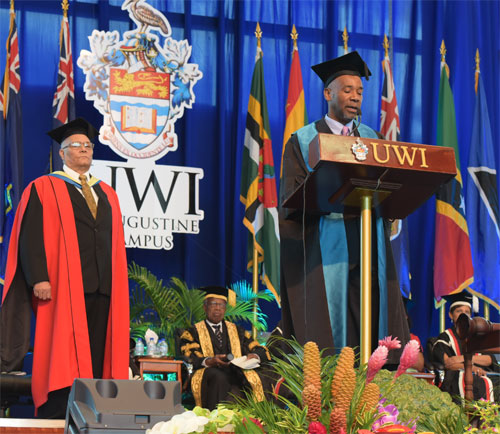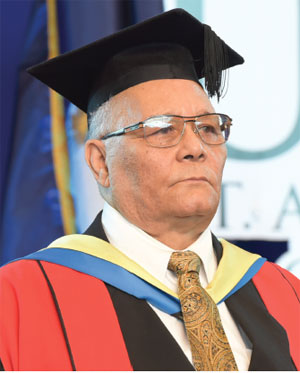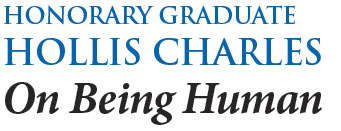
Citation: Hollis Raymond Charles,
Degree of Doctor of Science (DSc)
Chancellor, if ever we doubt the importance, the relevance or the validity of the enterprise which is The University of the West Indies, we need look no further than Engineer Hollis Raymond Charles as proof of the potential in all our beginnings, however modest or majestic, the potential for world class excellence.
He has worked with many organisations on the application of science and technology to sustainable development; management of the environment; and more recently on climate change. Those organisations include:
- The Government of Trinidad & Tobago
- The United Nations Economic Commission on Latin America and the Caribbean
- The Organization of American States
- The United Nations Development Programme
- The Commonwealth Secretariat
- The United Nations Industrial Development Organization
- The CARICOM Secretariat
- The West Indian Commission
- The International Development Research Centre
- The World Association of Industrial and Technological Research Organizations (of which he is a founding member and also served as President)
And the list does indeed go on.
 Back in Chapter One of his story, Hollis Charles was born in Chaguanas. His transplantation to Port of Spain to attend Queen’s Royal College and exposure to the Central Library ushered in a feast of reading and fascination with the world. That sense of wonder has barely ever abated, but at the age of fifteen he was obliged by familial circumstances to seek employment. The Trade Apprenticeship Programme at Trinidad Leaseholds Limited (later to be known as Texaco Trinidad Limited) afforded him the opportunity to work and study and so he formally began what would blossom into an outstanding engineering career. He became the youngest Trinidad and Tobago national appointed to the Senior Staff of Texaco Trinidad at the ripe old age of 23! Back in Chapter One of his story, Hollis Charles was born in Chaguanas. His transplantation to Port of Spain to attend Queen’s Royal College and exposure to the Central Library ushered in a feast of reading and fascination with the world. That sense of wonder has barely ever abated, but at the age of fifteen he was obliged by familial circumstances to seek employment. The Trade Apprenticeship Programme at Trinidad Leaseholds Limited (later to be known as Texaco Trinidad Limited) afforded him the opportunity to work and study and so he formally began what would blossom into an outstanding engineering career. He became the youngest Trinidad and Tobago national appointed to the Senior Staff of Texaco Trinidad at the ripe old age of 23!
Although earning what seemed like a mountain of money at the time, he remained in search of intellectual stimulation. Hollis Charles had the tenacity to apply for a scholarship from the company and found himself at a critical juncture: either pursue further technical qualifications in London or enter the newly minted Faculty of Engineering at the St Augustine Campus of The University of the West Indies. The latter was perhaps more demanding, requiring him to acquire advanced level subjects for matriculation. The record shows that he chose well. While at The UWI, he enjoyed the vibrant atmosphere and rubbed shoulders with students from diverse backgrounds. He also read courses in management from the Faculty of Social Sciences and was President of The UWI Guild of Students. He graduated with a BSc in Electrical Engineering in 1968 and changed tack to industrial engineering with the award of an Industrial Development Corporation Scholarship to train in production management in the U.S.A. On his return he was involved in the installation and management of the first production plant in the country to manufacture and assemble the plant components.
In 1970, Mr. Charles joined the Caribbean Industrial Research Institute (CARIRI) as founding Co-Director - it would be a twenty-year relationship that nurtured a growing industrial sector. He undertook a sabbatical in 1983, to become the first from the English-speaking Caribbean to be admitted to the prestigious Sloan Masters Programme at Stanford University in the U.S.A.
He is a former Chairman of the Board of Engineering of Trinidad & Tobago, a past President and a Life Fellow of the Association of Professional Engineers of Trinidad and Tobago and received their highest award in 2011. Engineer Charles is a Fellow, Foreign Secretary and immediate past President of the Caribbean Academy of Sciences and a former Chairman of the Board of Governors of the National Institute for Higher Education, Research, Science and Technology (NIHERST). He has also been very active in civic society as a charter member of the Lion’s Club of St. Augustine, former President of the T&T Rugby Football Union, and former President of the T&T Squash Racquets Association. Further, since 1979, he has been involved with international efforts to enhance the role of civil society in governance.
Hollis Charles’ vision of an engineer is someone who does the next thing that needs to be done and addresses whatever the society needs. He knows his way around science, engineering, management and policy formulation and has consistently employed this knowledge in service to the region. He is also reputed to know his way around a dance floor; having mastered the Tango sufficiently to have his version etched in the minds of witnesses.
Chancellor, for long and distinguished service in the fields of engineering and science, I present Engineer Hollis Raymond Charles, and ask that by the authority vested in you by the Council and Senate of The University of the West Indies, you confer on him the degree of Doctor of Science, honoris causa.
St Augustine Campus
October 2015
 
I am very glad that you are all here to hear me express my sincerest appreciation to my Alma Mater, The University of the West Indies, for honouring me with this award. When we receive awards from people who are not family, there is always the factor of what the sociologists call “the attraction of the stranger.” People who do not know you with all your scabs and blemishes may consider you exotic and offer accolades. Your own however, know your scabs and blemishes, so when they honour you, it is special. I am therefore exceedingly grateful to receive this Award and I thank the University most humbly.
To my fellow graduands. When persons with grey hair are asked to address you on this occasion, we are expected to distill our long years of experience and pass on to you that accumulated wisdom – in ten minutes! Fortunately, I have experience with that also. Whenever I am about to start a conversation with my daughter, she always prefaces the discussion by saying to me, “Give me the short version.”
I thought that in this short version today, I would give you a couple of insights from my life which might help you in yours and also share with you some of what I see in your future.
The first insight I want to share with you began one day, 50 years ago, when I came the closest I have ever been to being killed. I was a trainee engineer working at a small power station, when it blew up. A live 6600-volt busbar terminal grounded directly to earth. There was a fantastic explosion yards from where I stood and the busbar, the heart of the power station, went up in flames.
I can still hear the generators screaming as though they were alive and in pain, as they tried to handle the power demand of a direct fault to earth at 6600 volts. The generators eventually shut themselves and the entire power station down. That of course created other problems because without power the pumps stopped working and the water in the boilers began draining out. The furnaces were still working so the boilers were quickly becoming large bombs. The heat of the explosion was so intense that the massive porcelain insulators melted and molten porcelain, looking like milk, flowed along the floor!
From that time of shock and fear, and fire, noise, chaos and danger, I took away one enduring message. Nobody ran. Nobody ran away and nobody ran at all! People moved swiftly and purposefully to do what had to be done to secure the situation, but nobody ran! Everyone moved to do what had to be done.
Years later when as a senior engineer I became involved in discussions on what was the role of the engineer in society, I would draw on that experience and say that the role of the engineer was to do the next thing that had to be done. Not only in engineering but whatever was the next thing that society needed to have done.
Fast forward some years and I have then moved out of ‘hard’ engineering into research, science and technology. The United Nations asked me to go to Sierra Leone to look at the feasibility of establishing a Scientific Research Centre. This was just before Sierra Leone itself blew up and descended into civil war. In preparation for the assignment, I was sent a lot of information about the country. Most of that information made it quite plain that the country was dangerously unstable. One piece of data however struck me as important. It was a statistic which showed that the average years of education of a citizen of Sierra Leone was 12 months for men and eight months for women.
Now in that country there must also have been persons who would have had 15 to 20 years of formal education. So if the average was 12 months, what must the other side of the distribution curve been like? It occurred to me then that for a country such as Sierra Leone, the cadre of trained people in that country had to be their most important economic resource. I extended that thought to all small economies such as Small Island Developing States (SIDS), to which we in the Caribbean belong. Note that the criterion is small economy. The country may be large but the economy small. For small economies you and I as tertiary-educated people, are our most vital economic resource, and the doctrine I had previously formulated for engineers applies equally to all of you. Your role in society is to do the next thing that has to be done.
Today you will be conferred with first or advanced degrees in various disciplines and areas of learning. More important than those certifications however, is the education you have obtained at the tertiary level. The specific areas of learning in which you engaged, were the templates which carried your tertiary education. Through them you have been trained to garner or generate information and use it to create intellectual capital – new knowledge, answers to questions and solutions to problems. It is that capability which the University is certifying today.
When you take off your gowns later, you are immediately to put on that responsibility which you will carry for the rest of your life. I am saying to you that notwithstanding the area of your degree, your responsibility henceforth, is to do the next thing that is needed to secure the society in which you find yourself. It may be that what is needed requires you to become the next eminent specialist in a field of learning – or open a grocery, to instigate a campaign, change the government or start a revolution – in eating habits. The next thing that needs to be done becomes your responsibility from today!
My next piece of advice is both a DO and a DON’T. In choosing a career please DO something you like. DON’T follow the money. If you do what you like, you will become better at it than the average person because you will continue to work at it long after the average person has become tired or bored. You will then become better than average at it and somewhere in the world there will be people willing to give you money to do what you like. That is a definition of happiness.
You all know about the Hollywood Oscar Awards. What most people do not know is that Oscars are also given in the technical areas. One day I just happened to turn on the TV and saw a show on the technical Oscars. There was an Englishman getting a lifetime award in animation. In his acceptance speech he said the following, “In 1947 I came to Hollywood and found that there were people there who were willing to pay me to do, what I would have done anyway.” He was getting an award for spending his life doing what he liked and getting paid to do it! In every career there are ups and downs. If you are doing what you like, the downs are survivable. If you are not doing what you like, the downs may cripple or even kill you!
The unhappiest people I have ever met were persons who were doing a job they hated but which paid so well, they could not leave. That is a definition of hell. These are the people who, abuse their families, become substance abusers, get heart attacks and strokes and generally die prematurely. Do what you like. You will be happy and the money will come. Universities may even give you awards!
If you take away only one thing from what I say today; take what I have just said.
The Lebanese poet Kahlil Gibran said that you live in the house of the future where I cannot go. I have however, looked through the windows and can tell you some things about the house in which you will live.
The century in which I grew old was one which saw unprecedented and unbelievable technological developments based on what is now called ICT. The century in which you will grow old will see equally now unbelievable advances in human biology.
The mapping of the human genome which was completed in 2003 was a milestone in human development. Of greater significance however was the decision to distribute that information freely to all the world. The results of that decision are already beginning to trickle in. Growing of rudimentary body parts are already commonplace. This month the growth of a prototype kidney was announced and gene editing is the new frontier. The trickle will become a flood and will create in your century, a world that will be miraculous!
Not all of it will be pretty. Monsters will be created. Why? Because whatever can be done, will be done. The first monsters will appear in sport. Why? Because sport is entertainment and entertainment will continue to be the biggest business in the world.
You will have to be part of answering some of the most fundamental ethical questions about what being human really means. The next 100 years could very well become the most important period in human history.
Your future is going to be hallmarked by great social responsibility, but it will be incredibly exciting! You are very, very fortunate.
It only remains therefore for me to wish you the very best of luck. Remember to face every new day with the expectations of excitement!
Enjoy!

|





